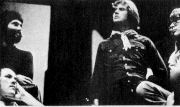Mother Country
Down to interpretation
Next Song
Full Song List
Classic Albums Main Page
Lyrics
There was a story in the San Francisco Chronicle that I forgot to save,
But it was about a lady who lived in the good ol' days
When a century was born and a century had died,
And about those good old days, well, the old lady replied:
"You know, there was just a lot of people who were doin' the best they could."
She said that the good old days were just a lot of people doin' the best they could.
And then the lady said that they did it, pretty up and walkin' good.
Whatever happened to those faces in the old photographs?
You've seen them, the little boys...boys, hell, they were men
Who stood knee deep in the Johnstown mud.
It was during the time of that terrible flood
When they listened to the water, that awful noise,
And then they just put away the dreams that belonged to little boys.
Oh, the sun is going down for Mister Bouie,
As he's singing with his class of nineteen-two.
Oh, mother country, I do love you.
Oh, mother country, I do love you.
I knew a man named E.A. Stuart, he spelled it S-T-U-A-R-T,
And he owned some of the finest horses that I think I've ever seen;
And he had one favourite, oh, she was champion, the old Campaigner,
And he called her "Sweetheart On Parade",
And she was easily the finest looking horse that the good Lord ever made.
But old E.A. Stuart, he knew he was goin' blind,
But he said "Before I go I've got to drive her one more time."
So people came from miles around, and they stood around the ring
But no one said a word,
They just stood there and no one said a thing,
And they're opening up the gates back there, and here they come
E.A. Stuart in the wagon right behind,
 And he's sittin' straight and proud,
And he's sittin' straight and proud,
And he's drivin' her stone blind:
And, would you look at her, ah, she never looked better or finer than today.
Yeah, it's E.A. Stuart and the old Campaigner,
Sweetheart on Parade,
And the people cheer
While I saw grown men break right down and cry.
And you know, it was just a little while later
That old E.A. Stuart died.
All lyrics copyright John Stewart
This song is based on a story told to John by his father, who was a horse trainer for EA Stuart. The event at the end of the song actually happened. The horse that was ridden before Stuart's death though wasn't called 'Sweetheart On Parade' (that was one of his horses though). John also took inspiration from a book called 'The Great Tradition' - which stuck in his memory because of the faces of the poor children it depicted. This is John's favourite song off the album - and along with Pirates he felt it represented something new in songwriting. This song, like much of the album, was recorded in one take - for more 'feel' in performance (or an honest sweatiness as John said). He was worried that the album would prove uncommercial because of this. It's the lack of middle-of-the-road predictability that helps the album attain classic status. According to John he was still searching for his voice - but it's this very exploration and lack of routine that makes the album so fresh still.
Interpretation
The story recounted then is a fact from the past - the final event being one John's father had been present at. So these aren't the singer's personal memories, but ones passed down from his ancestral 'bloodlines'. We're told this story had previously been forgotten - now it's remembered (as in tracks 3/4). This mirrors the ability of bloodlines, like nature, to die and be born again -'a century was born and a century had died'. A new attempt at rebirth is tried in this song - to bring the past ('old photographs') to life. The subject is of rebirth too - the life-giving power of the sun is expressed through Mr Bowie's death. The past, as earlier, is not merely 'the good old days', but also has awful episodes like 'a terrible flood'. The romantic imagination has to take into account the mundane harsh realities of the past. The community pulls together, while dreams and innocence are shattered by hardship. This is ironic as imagination and dreams are the only way to recreate the past in the present. This section also reflects on the power of song (in it's recreation of the past, and it's community spirit). The present tense is used in both Mr Bowie's and EA Stuart's story. In both cases a community comes together before a death. Death and rebirth: the necessity for death so the new generation ('class of 1902') can renew society. This song is a triumphant celebration of the power of renewal.
Up to lyrics
Next song
Full song list
E mail me at: simonbrewer@postmaster.co.uk if you have any comments, ideas, info....
simon
 And he's sittin' straight and proud,
And he's sittin' straight and proud,